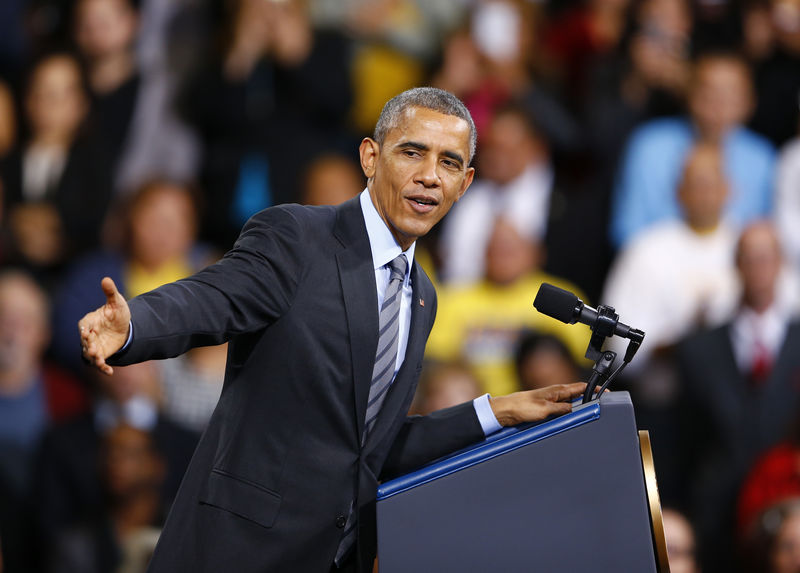By Steve Holland
LAS VEGAS (Reuters) - President Barack Obama defended his decision to bypass Congress and overhaul U.S. immigration policy on his own on Friday, saying he was forced to act because House of Representatives Speaker John Boehner would not let legislation come to a vote.
With many Americans skeptical of his decision to bypass Congress and impose an immigration overhaul unilaterally, Obama attempted to rally support for his move in a speech at a Las Vegas high school, saying illegal immigrants need a chance to come out of the shadows.
He engaged in a cross-country debate with Boehner, the top U.S. Republican, who accused Obama in Washington of sabotaging chances for bipartisan legislation and vowed to lead a fight to block his executive actions.
In the summer of 2013, the Democratic-run Senate passed compromise immigration legislation but the bill died in the Republican-controlled House. Obama said he waited to see if the House would ever pass the legislation, but Boehner would not let it come to a vote.
"I told John Boehner, 'I'll wash your car, walk your dog, whatever you need to do, just call the bill," Obama said. "And he didn't do it."
To those lawmakers who feel he overstepped his constitutional authority, Obama said his message to them is: "Pass the bill."
Obama's move threatens to herald a new round of partisan gridlock in Washington as Republicans who will control both chambers of Congress in January react with scorn to his decision.
Republicans remain split on the best course of resistance to Obama's action easing the threat of deportation for some 4.7 million undocumented immigrants. Conservative groups were already pulling together legal strategies to challenge it.
"With this action, the president has chosen to deliberately sabotage any chance of enacting bipartisan reforms that he claims to seek. And as I told the president yesterday, he's damaging the presidency itself," Boehner told reporters.
"We're working with our members and looking at the options available to us," he said. "But I will say to you, the House will, in fact, act."
Obama received a rousing welcome from a largely Latino audience at Del Sol High School in Las Vegas, the same place he visited just after beginning his second term in 2013, when he laid out his principles for immigration reform.
"Si se puede," they chanted.
A heckler shouted at Obama that his order did not go far enough. Obama engaged him from across the high school gym.
"I've heard you, young man, I've heard you. But what I'm saying is that this is just a first step," Obama told him.
Outside, a couple of dozen protesters who opposed his actions shouted slogans and held up signs that said: "Stop Obama Amnesty."
Before getting off Air Force One shortly after landing in Las Vegas, Obama signed two presidential memoranda to set in motion part of the biggest U.S. immigration changes in a decade.
Just hours after his speech on Thursday night, Republicans launched a long-threatened lawsuit against the administration on another topic, accusing it of abusing executive authority through implementation of the president's "Obamacare" health reform law.
Republicans have said in recent weeks they would consider adding a challenge to the Obama immigration order to the healthcare lawsuit.
But the most prominent strategy under consideration, supported by many conservatives in Congress, is to withhold funds for implementation of the immigration order from a major spending bill needed to fund the government by Dec. 11.
A fight over the spending bill could lead to another shutdown of federal agencies, one year after a 16-day closure that inflicted heavy political damage on Republicans.
"We do need to find a way to really push back," Republican Senator Jeff Sessions of Alabama, who has called for using the spending bill as a vehicle to challenge the order, said at the Heritage Foundation.

Other Republicans have suggested a range of options, from opposing all of Obama's nominees unless he relents, to stand-alone legislation undoing the order and even impeachment.
(Additional reporting by Emily Stephenson, David Lawder and Amanda Becker in Washington; Editing by John Whitesides and Tom Brown)